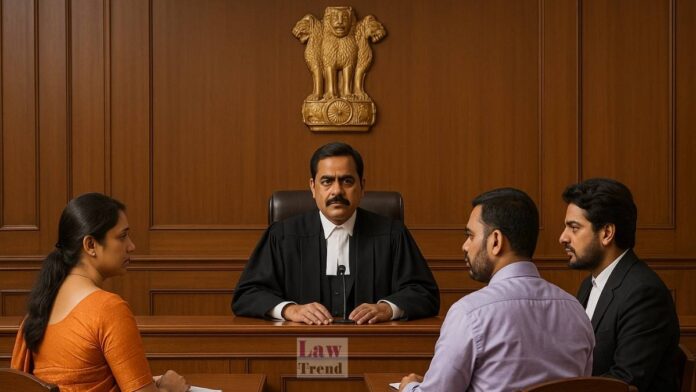Family Courts are specialised arenas for marital and family disputes—places where legal battles mingle with emotional meltdowns. Here, procedures often follow their own unique rhythm, and divorces sometimes slip through on grounds the law barely defines. It’s basically the space where emotions meet evidence, drama meets documentation. And then comes the Family Judge—the lone officer with the power to rewrite the whole marriage saga, from “happily ever after” to “see you next hearing.”
I still remember my first appearance before a Family Judge as a young lawyer. For days, I barely slept—reading the maintenance petition so many times that I could practically recite it in my dreams. I rehearsed arguments, counterarguments, and even the pauses in between, fully prepared for the emotional rollercoaster that family cases usually bring.
With all that preparation, I walked into the courtroom brimming with hope that the Judge would understand the psychological stress both parties were going through. But within minutes, reality tapped me on the shoulder. The Family Judge turned out to be far brisker—than I had imagined. Suddenly came the curveball questions: “Why do you have kids if you can’t maintain them?” and “Did you bring them into the world expecting government sponsorship?”
I stood there wondering whether I’d stepped into a courtroom or a surprise stand-up show. That encounter pushed me to dig deeper: what exactly are Family Courts, and who are these Family Judges running the show?
The Family Courts Act, 1984 didn’t appear out of nowhere. It was Parliament finally hitting the reset button after years of pressure to overhaul how India handled family disputes. For decades, women’s groups, welfare organisations, and activists had been saying what everyone could see: regular civil courts—slow, formal, and drowning in paperwork—were simply not built for messy marital battles. And so, on 14 September 1984, the Family Courts Act came into force with Presidential assent—promising quicker, fairer, and more settlement-driven justice for families in conflict.
The mission was clear: create specialised courts with trained judges and counsellors who could settle disputes quickly, without letting every marital spat drag into a marathon courtroom battle. A courtroom where couples were encouraged to speak for themselves, make their own averments, and ideally get through the process without a battalion of lawyers. All of it was meant to happen behind closed doors, wrapped in confidentiality, keeping family fights firmly away from public glare.
What once looked like a clear roadmap now feels more like a fogged-up windshield.
Take a look at our other specialised laws—NGT, CAT, Consumer Forums, NCLAT—the full expert squad. Each one creates tribunals stacked with specialists and clearly spells out who’s allowed to sit on the bench. Judges, technical members, subject-matter pros—the whole mix is laid out like a perfectly measured recipe. In short, those bodies run on expertise, not guesswork. But the Family Courts Act? Not a word on qualifications. Which is how judges who’ve spent years swimming through commercial suits or criminal trials suddenly land in Family Courts as Principal Judges. It’s almost like handing a tax officer a mic and saying, “Great, now host a marriage-counselling session.”
Family Judges often walk into the storm of human conflict armed with law books—but no specialised training in psychology, emotional health, or the nuances of family welfare. And that’s where the cracks begin to show. Because how do you grasp the layers of a marriage gone wrong if you’ve never been trained to read the emotional undercurrents?
Not to forget, the courtroom gems—those unforgettable one-liners that spread through the corridors faster than case laws—those off-hand comments that leave everyone wondering whether they’re in a court of law or a family WhatsApp group gone rogue.
Lawyers mid-submission being told, “Oh please, this is normal… my wife does the same!”, “Ma’am, you’re claiming 6 lakhs a month—are we settling maintenance or financing a Bollywood blockbuster?” , And then the mutual-consent moment, the judge leans back and quips, ‘So tell me—what’s the plan after this? Another marriage? Just so you can come right back here for the sequel?’ These aren’t borrowed from a courtroom sitcom— they’re the real-life comments that echo far beyond the courtroom walls, the ones that leave you wondering how some of India’s most sensitive family disputes end up sounding like scenes from a primetime reality show.
So, what happens next? Family Judges, convinced that Family Courts can write their own rulebook, often pull off a full-blown two-in-one performance—first mediating behind closed doors, then gliding right back into the chair to rule on the same case. It’s the courtroom equivalent of a quick-change magic act: mediation at 11 AM, judgment by 3 PM—one judge, two roles, and barely enough time to switch expressions.
Supposedly created to protect secrecy, Family Courts now treat confidentiality like a decorative prop. Step outside any packed courtroom and you’ll hear the staff loudly announcing cases as if hosting a reality-show lineup: “Item Number 11: X vs Y! Item Number 12: A vs B!”. And the grand cloak of privacy? It slips even further when parties join via video conference—screens full of lawyers, clerks, and litigants waiting for their turn, all watching names flash across the display.
A forum meant to keep personal matters discreet now occasionally feels like it’s running its own mini public broadcast—minus the commercial breaks.
It’s high time we hit pause and rethink India’s family dispute machinery—minus the sugar-coating. A reality check is overdue, and so is a redesign.
By Preeti Singh,
Advocate,
PS Law Advocates & Solicitors




